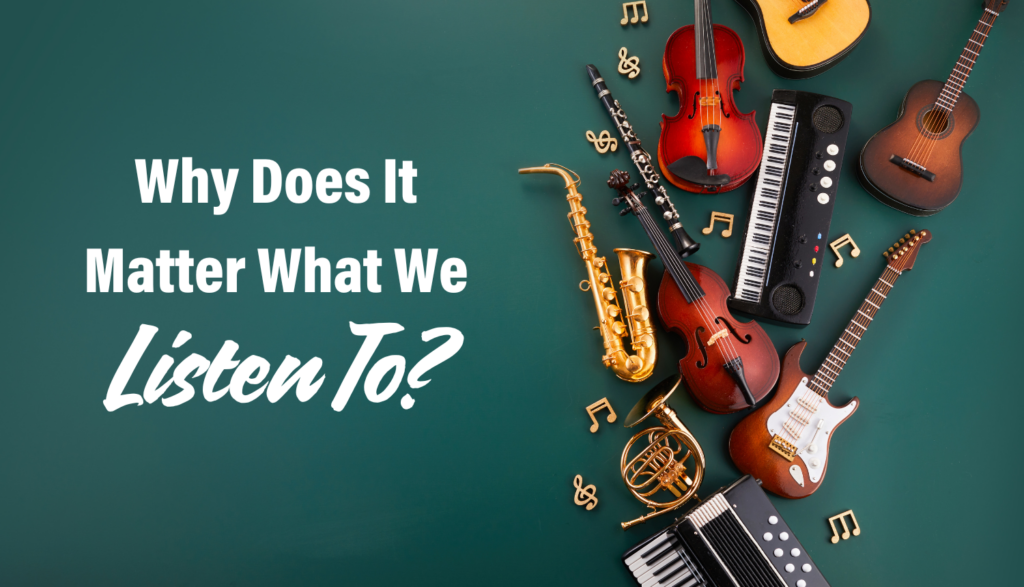At the end of the year, many Spotify listeners rush to see their Spotify Wrapped, a collection of stats that sum up the listener’s year. Spotify will tell users their favorite artist, favorite song and just how many minutes of music they listened to. And apparently, most Spotify users listen to a lot of music.
On average, a Spotify user listens to approximately 3,695 minutes of music each year, as of the 2023 Wrapped. So, what impact do those 3,695 minutes—which averages out to about 10 minutes, or two-to-three songs per day—have on our brains, our habits and our spirituality?
Well, it really depends on what you’re listening to.
Our brains like rhythm and rhyme. That’s why it was easy for us as kids to remember the ABC’s (thanks to that song that is probably running through your mind right now), or, courtesy of Uncle Charlie, how I know what the fruits of the Spirit are (and that a watermelon is not one of them). It’s also no secret that children learn, and subsequently memorize, more quickly than adults.
According to Geisinger health, motor memory also plays a role into how we remember lyrics so well, while we’d still be hard pressed to quote a passage from our favorite book. As we sing along to the songs we love, we move those lyrics from our short-term, or temporary, memory banks to our motor memory, the same place we remember how to ride a bike.
And that part of our memory is scary good. (When’s the last time you forgot how to ride a bike?)
It’s no wonder that the Bible tells us to sing to God throughout the Psalms. That sentiment is echoed again in the New Testament. Building habits of praise puts those words of thankfulness and exhortation in our minds and ultimately, in our hearts.
Unfortunately, not every song on Spotify sings the praises of God’s amazing works. Surprise surprise, many do the opposite. Especially in recent years, we’ve seen a rise in songs tagged as “explicit.” And even if a song doesn’t carry an “explicit” tag, many are not exactly “clean.” They can be free of bad language and still praise profane acts and issues. Hozier’s 2014 hit “Take Me to Church” isn’t profane, but it equates sex with worship and physical intimacy with salvation, according to our reviewer Adam Holz. And that might not be the sort of thing you want settling down in a child’s motor memory … or your own.
Much of Christian theology focuses on setting our minds and hearts on the things of God (Colossians 3:1-11, Psalm 37:4), but your brain only has so much room. Singing explicit lyrics–or even listening to them enough times–fills your brain with the things that can pull us away from God and could even influence how we behave.
Music is powerful, but it isn’t inherently bad. Even knowing music has this power in our brain, it would be difficult to avoid music completely, and I don’t think you’d want to. (I, for one, am tens of thousands of minutes ahead of the Spotify average). For many of us, music is an almost constant companion—something we listen to while we drive to work, exercise or even write blogs. And the younger you are, the more likely that music will be a big part of your life, playing in the malls, through a new pair of AirPods or behind Instagram reels. Music can calm us down or fire us up. And at its best, music can even help us contemplate God.
But for the amount of time music-listeners give music, exercising a fair bit of caution is wise.
To go one step further, watching what you listen to is one thing, but while the Beatles catalog is fairly clean, it still doesn’t use the scientific facts of song memory to our spiritual advantage.
Contemporary Christian Music and its musical forebears, hymns, fill the listener’s mind with the things of God. The music can encourage forgiveness instead of bitterness, love instead of anger, praises instead of curses and ultimately, a life lead by God’s will instead of our own.
And for you parents out there, remember that when you’re listening to Christian music at home or in your car, you’re not necessarily the only one who’ll be listening. Your kids might be listening, too—and those God-honoring lyrics might just be making inroads into their own motor memories.
So, if you’re jamming out in the car with the windows down, playing background music in your headphones while cleaning the house or letting quiet and calm music lull you to sleep, play music that is spiritually edifying. After all, it’ll be rattling up in your brain for quite a while.








4 Responses
I’m an old school almost 45 year old man who still listens to CDs and on average I listen to at least two hours of music a day. I like a little bit of everything though. From the Stones to the Beatles, Stone Temple Pilots, Prince, Enya, Josh Groban, Eminen, Miley and Billy Ray Cyrus, Steven Curtis Chapman, Skillet, For King and Country, Garth Brooks, U2, David Bowie, Peter Gabriel, Paul Simon, Johnny Cash, Miles Davis, Neil Young, the Eagles, Queen, Tom Waits, Modest Mouse, the Dave Matthews Band, Cat Stevens, and so much more. I’m very eclectic to say the least.
Yep. I also prefer CDs and wish my current car still had one like my previous one did. I like your wide variety mentioned.
Plugged In, this was a good article; it brought to mind how we need to be careful even about the messages that “Christian music” sends, since not all contemporary songs or even classical hymns deliver messages we necessarily want our children or even our own selves internalizing. This isn’t a call to cynicism (toward religious or secular music), but more an acknowledgement that pro-social and objectionable content can be found even in music that markets itself toward our sort of target audience.
This is very interesting that music lyrics can be remembered in such a way.
Maybe it is just my radio stations, but it seems the newer pop music is more cynical. Since I played violin for many years, I do enjoy listening to any song I catch on the radio with a unique sound, but I find myself turning to Christian stations, country, classic rock, and my CDs. It is good to analyze the words as well, though, to see what the message of the song really is. I had avoided songs with swearing, because it will get stuck in my head, but perhaps I should reflect more.
Excellent article. Well done. Thank you.